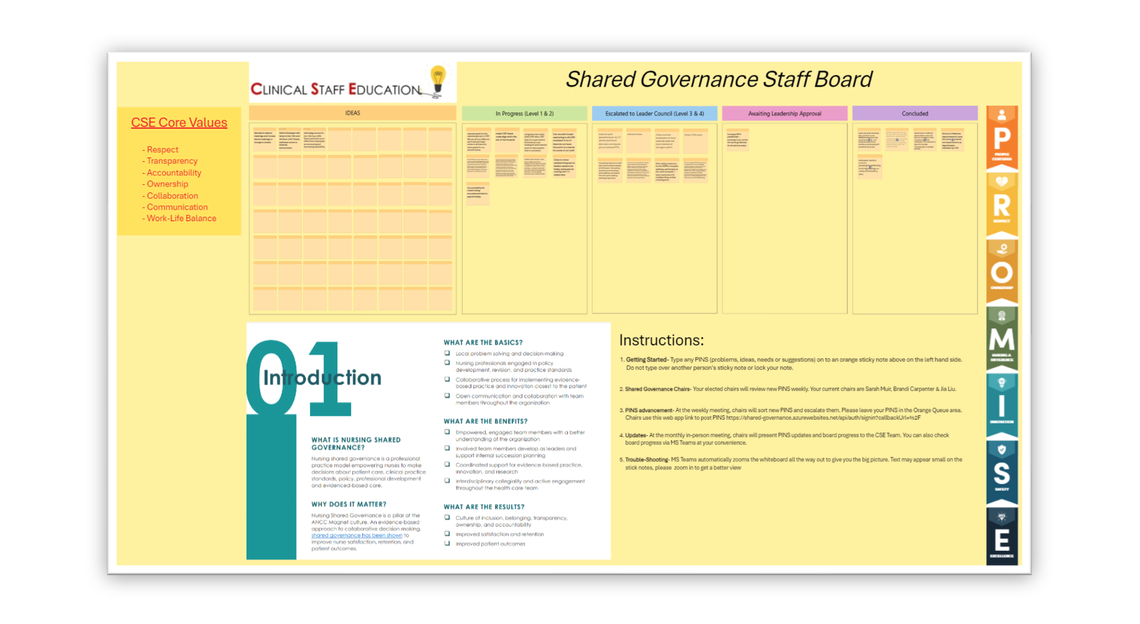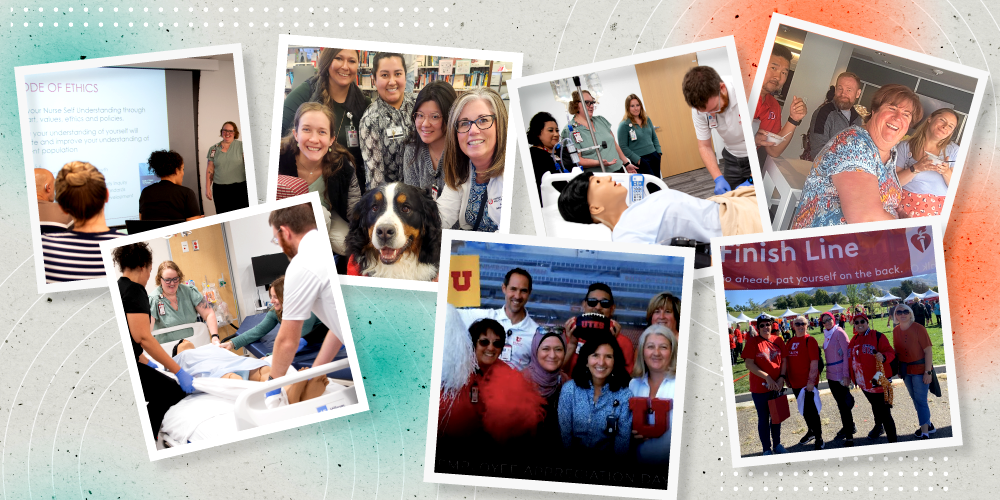Tell me about your team – who’s on it, what do you do?
I am representing Clinical Staff Education (CSE). We have mentors (CSE nurse leaders) as well as three different co-chairs for our team because we cover a very wide variety of clinical areas across our health system.
I am the Team Chair for inpatient services, which includes acute care and critical care mostly in the University Hospital as well as NRH. Sara Muir is the representative for our central office, and Brandy Carpenter represents ambulatory services.
The reason we have three different chairs is so we can accurately understand the workflow of each area that CSE covers. Input from the different leaders in those areas gives us a better understanding of how our department wants things to be run.
Tell me about how shared governance works within your team – do you have a board, do you huddle, how’s it going?
Our department is very diverse. We have employees that work off site or from home and it’s difficult to have a physical board where everyone can gather and give their input.
Virtual Team Board: Our team has created a virtual board so that all our team members are able to provide input, whenever and wherever it’s convenient for them. It’s worked out very well and we’ve gotten quite a bit of feedback so far.

How We Huddle: Because we do have such a big department, it is hard to have a huddle to get everyone involved, so we do weekly huddles with all of the co-chairs as well as our managers and directors as mentors. During huddle, we discuss priority and level of PINS, then we share with the team during our monthly meeting so that we can get input from the broader group and go from there.
Can you give me an example of any exchanges around problems, ideas or needs that people had to decide as a collective whether or not to work on it?
Organizing Our Shared Files System – One of the topics that we've discussed is our team works a lot on Microsoft Teams because it's a good place for us to store all our documents. However, over the years we've had multiple team sites where everything becomes completely convoluted and not organized. One PIN suggested consolidating and organizing everything to make it easier for our team to work with. So, we (each co-chair) and our mentors came to the consensus that we should go back to the team to ask them what they want.
"Do you want to form a work group to consolidate it, or should we just do it individually?"
We collectively decided that since there’s so much information, we’d give everyone a month or two to move and consolidate their own files and decide what they want for themselves. Then, we'll come back together as a group to see if that was effective. If there's more work that needs to be done, we’ll revisit and form a work group if needed.
What impact (if any) has shared governance made on the team?
A lot of little problems for example, the one I mentioned, are things that we can work on as a team with not much outside influence or outside approval, but we never knew our teams had this problem until it was brought up. These are things we can do – we just need to set up, plan and go forth with it.
Shared governance is still in the very early stages, so it's hard to say whether or not it has had a huge impact on all the outcomes, but I think one of the greatest benefits to having the team board is that even if it's a large scale problem that we are not able to solve immediately, it is still up there on the board and until we are able to figure it out, it is visible.
"Having a physical indication that problems are in progress gives our team some reassurance that something is being done, even if the progress is slow."
I think the hardest part about shared governance is really making sure that we are presenting this as a way for teams to provide a potential solution to the problem as well. Everyone can bring up a problem, but if they don't specify exactly what, or at least give a direction of what kind of outcome they're hoping to see, we won’t be successful. Over time, I think we’ll learn how to find a shared direction that's going to be beneficial for the group.
We want to hear from you!
Want to share your team’s story? It only takes 15 minutes!
Submit your story here or email Bridgette.maitre@hsc.utah.edu to set up a Microsoft Teams discussion.
What you’ll need:
- Pictures of your team and team board
- A picture of you – the contributor!
Jia Liu, MSN, RN
Health systems across the nation utilize shared governance programs to empower teams to make decisions impacting their practice and area of work, increase accountability and autonomy, and improve quality of patient care. The U of U Health Department of Nursing offers its model, along with tips, to assist any team in implementing shared decision-making in their respective areas.
As teams across the UUHC Department of Nursing work to implement shared governance in their areas, we’re learning about team experiences and the impact shared governance has had so far. This month, Brenda Baker from Radiation Oncology shares how her team leveraged shared governance to break down workflow barriers.
The Shared Governance Support Team has developed a list of resources for new shared governance leaders to equip them to lead and guide team members in engaging in shared decision-making at the local level.
